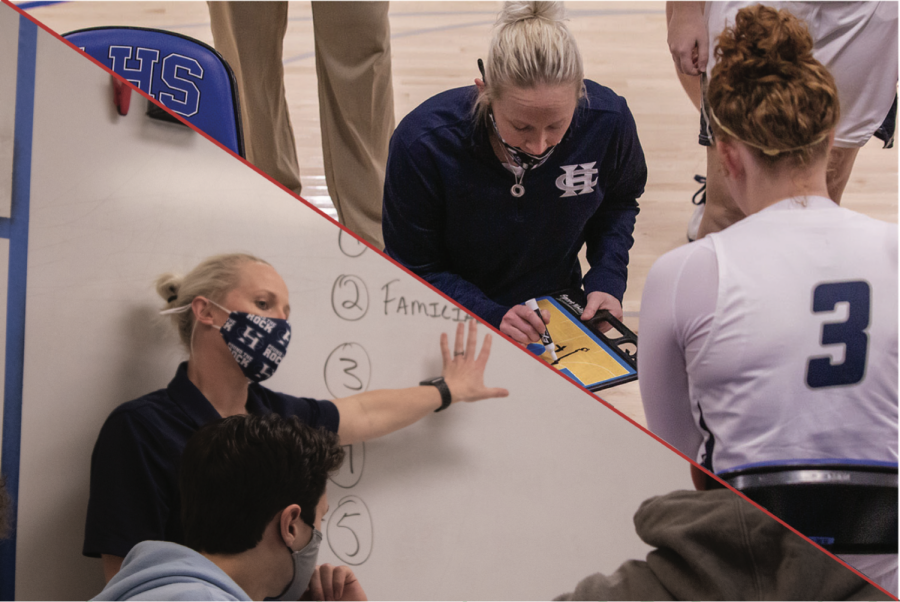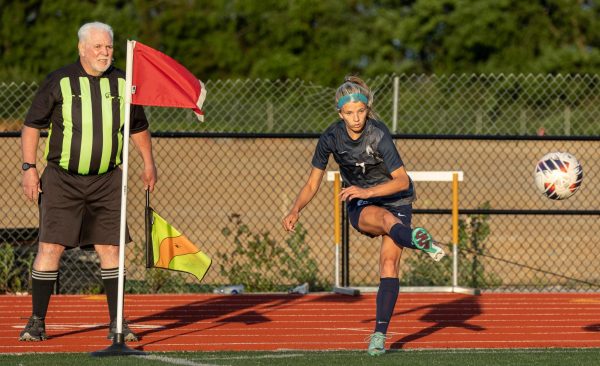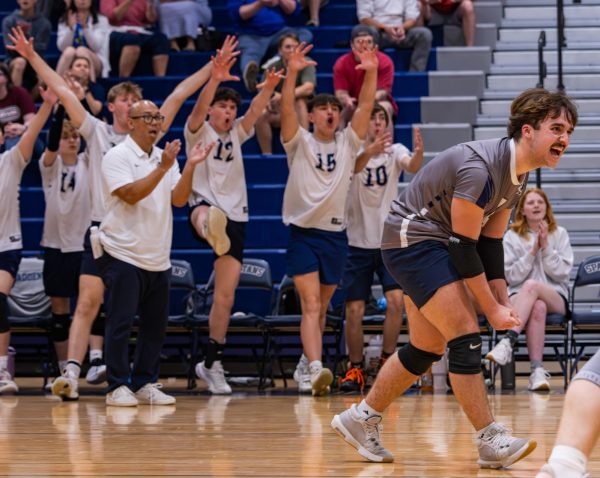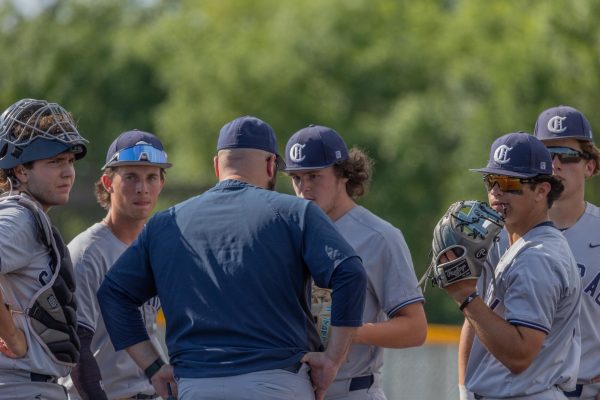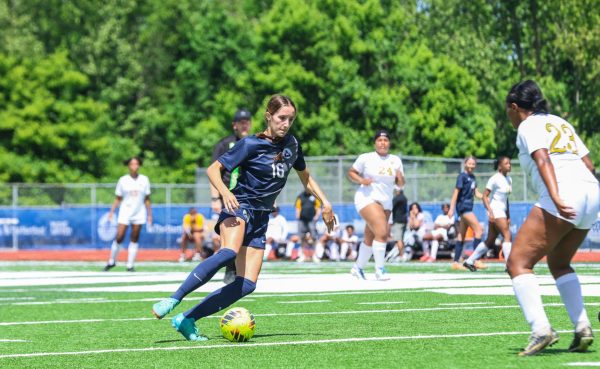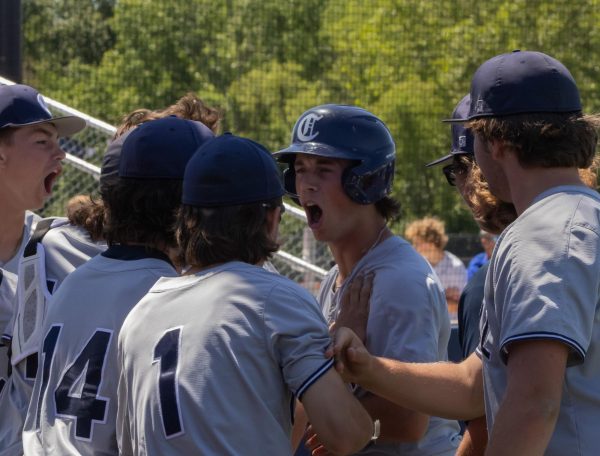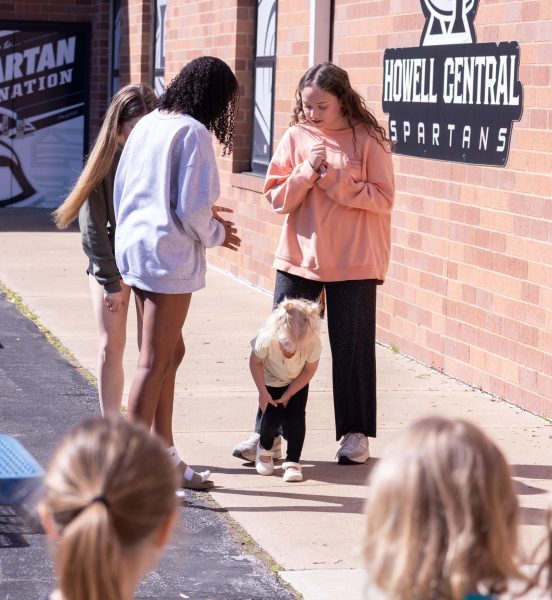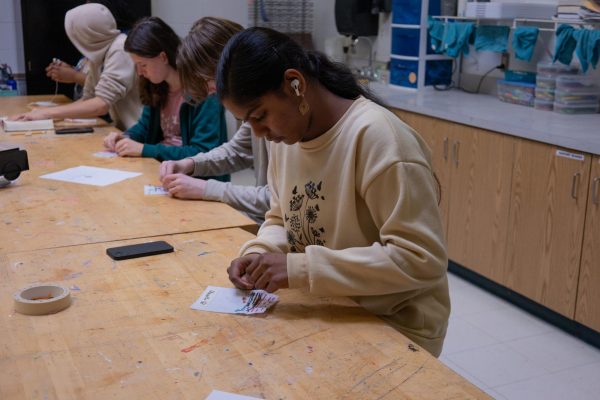Swinging From Coach to Classroom
Coaching and teaching affects teachers more than students realize
Coach Hayley Leake teaching her students and coaching her players. Many teachers who play both roles have difficulty in finding the right balance between the many aspects of their lives.
From the time she leaves practice until the time she gets home, Coach Hayley Leake has about three minutes of processing time. Intentionally reminding herself that her full attention and presence is the least she can bring to her family, who sacrifice so much for her to be able to coach. Walking through the door, she places all her things down to swoop up whichever kid she can catch first. While playing with her kids before either bedtime, she visits with her wife Suzanne to try and catch up on each other’s crazy days with much of their time overlapping between dinner cleanup, making night time bottles, or cleaning up toys.
After her kids and wife go to bed for the evening, Coach Leake begins her personal work. From 9 p.m. to 1 a.m. every night consists of neverending lesson planning, film clipping, scout working, basketball social media updating, and practice planning for the next day.
“If someone were to ask me the ‘why’ or the ‘how’ behind this, my answer would be simple,” Leake said. “There is no other way. You must give everything, everyday.”
Sacrifices like these are ones teachers and coaches make every day to be able to work with their athletes and students. This never-ending schedule is the daily life of a teacher who also coaches a sport.
Most students don’t understand the commitment coaching and teaching take. Hours upon hours go into a singular practice plan alone so imagine what it looks like after an entire day of teaching, coaching, and then going home to take care of kids.
Coach Leake finds the most difficult part of the combination to be balancing time evenly between all aspects of life.
“You have to know this job is a constant balancing act and true life balance in this is inaccurate,” Mrs. Leake said. “I think one phase of your life or one time of the year requires you to be there for a certain group or certain someone during the time.”
Agreeing with Coach Leake, baseball coach and AP Government teacher Nick Beckmann feels the hardest part about participating in both jobs is missing out on some of his kids’ activities.
“My son has practice four nights a week and a neighbor or my brother will drive him and my wife picks up a lot of slack,” Beckmann said. “You have no social life because every extra minute is spent with your family.”
There is so much additional prep that goes into a coaches job description that goes unnoticed. Little things like filling water bottles, scouting other teams, planning fundraisers all are additional aspects of coaching no one takes into account upon first discussion of what it means to be a coach.
“Practice planning, scouting, event planning, scheduling, feeder program development, social media trying to represent the team in an honest way, and additional player conversations take a lot of time,” Leake said.
Gameday prep especially is a huge factor for coaches across all sports. Things like clipping film and prepping a scouting report can keep a coach up as late as one in the morning when they have to teach the entire next day or cause them to sacrifice their plan period in order to get the film done.
Girls volleyball coach and social studies teacher Julie Gronek says gameday prep consumes a lot of her time.
“I do a lot throughout the school day for prep,” Gronek said. “I watch film during plan periods, or I watch film late at night when my kids are no longer awake. I would say at least 25 hours a week are put into
coaching outside of the regular practice times.”
Although there comes lots of stress with the combination of coaching and teaching, it does create a lot of joy for the coaches and teachers. The combination is able to create lasting relationships within the classroom and on the designated sports field.
Coach Gronek says teaching and coaching has created relationships between her and her former students. She even has a former student who works as her nanny.
“Gerica, my student manager from when I was coaching basketball, is my nanny now, so she helps out with my kids,” Gronek said. “It is someone you develop trust and a relationship with and trusting them to take care of your kids is pretty significant.”
Additionally, Coach Leake says relationships are a huge part of why she continues to coach and teach.
“The most rewarding thing about creating these relationships is seeing how each person is able to see how the other has interjected or put little things into their life that has made them happier or has allowed them to open their eyes to a new view on life,” Leake said.
Overall, teaching and coaching presents some incredible achievements for all coaches and teachers across the board, and this feeling of satisfaction despite their difficult day-to-day.
“The most rewarding thing about coaching and teaching is just seeing kids grow as a person,” Gronek said. “In the volleyball program in particular we have some outstanding young ladies who are very bright academically and getting to see and hear what their future plans are as long as influences we have had on them is exciting.”
Seeing student and athlete achievement is one of the biggest pushes for why these coaches and teachers do what they do. The achievement piece is also something teachers themselves try to do.
They try to do the best they can whilst balancing work, practice, and personal aspects of their lives. Through sacrificing time for others in lieu of their own needs, teachers hope to create a better version of themselves each and every day.
“I constantly want to be better for my kids, but I also want to be a better parent, mom, and wife,” Leake said. “You must ask yourself who is in front of me and what do they need in the moment.”
Your donation will support the student journalists of Francis Howell Central High School. Your contribution will allow us to purchase equipment and cover our annual website hosting costs. FHCToday.com and our subsequent publications are dedicated to the students by the students. We hope you consider donating to allow us to continue our mission of a connected and well-informed student body.



